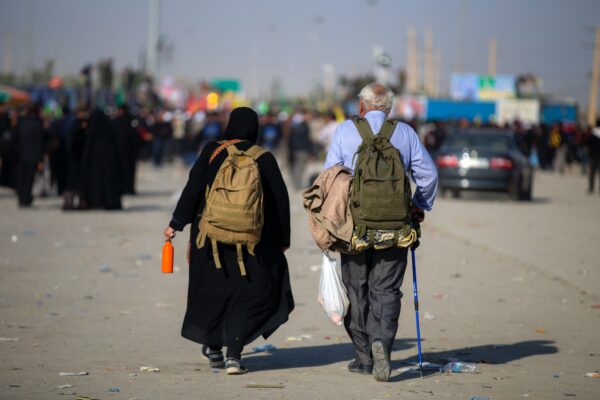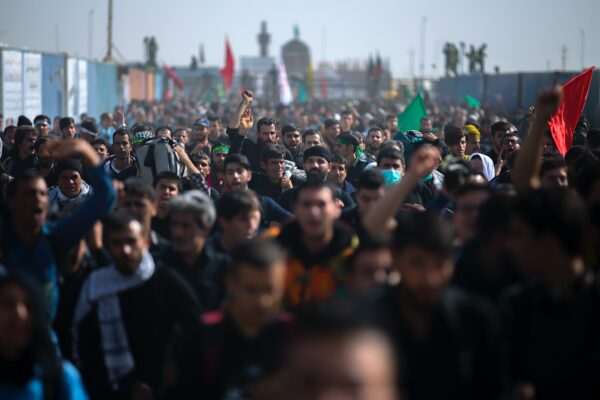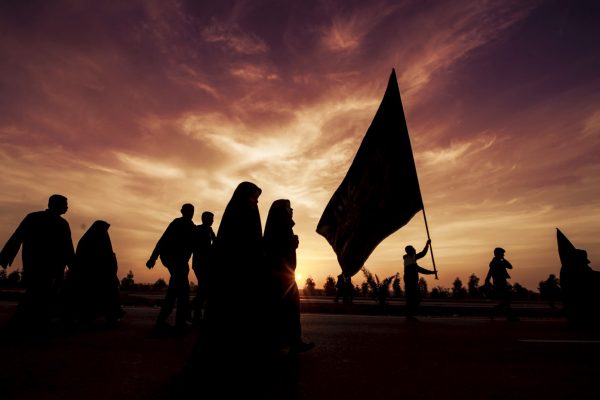Every Muharram, the topic of Shia self-beating rituals is in the spotlight. In this article, we take a deep dive into this ritual.
Every Muharram, the topic of Shia self-beating rituals is in the spotlight. In this article, we take a deep dive into this ritual.
Every Muharram, there are discussions on why Shia Muslims beat themselves. In this article, we look into this phenomenon and seek to understand the thought process and rationale behind the ritual in the hope of both enlightening myself and others.
Why is the Topic of Shia Muslims Beating Themselves Relevant?
The corpus of Islamic sciences is large and varied. There are so many things, from law, history and theology to ethics and morality, that need discussion and attention. So, why does it matter whether Shias beat themselves or not and whatever their reasons for it are?
The topic needs attention because a lack of understanding of it has caused many myths to emerge about the minority Muslim group. These myths are harmful and often cause hate and even persecution of Shia Muslims from other Muslim sects. Allah (SWT) has advised all Muslims to attach themselves to His rope and not become divided. If other Muslim sects are given an opportunity to understand the reasons Shia Muslims beat themselves, it can reduce any animosity and helps towards unity – or respect – at a minimum. There is such thing as disagreeing yet remaining respectful.
One more reason the topic deserves mention is because of the reasons attached to the ritual, which is explained in the next section.
Why do Shia Muslims Beat Themselves? An Overview
Shia Muslims beat themselves as a way of expressing their mourning for Hussain ibn Ali, the grandson of the Prophet Muhammad (PBUH), who was martyred in Karbala. A brief overview of the story behind his martyrdom is as follows:
After the death of Muawiya ibn Abi Sufyan, his son Yazid took over the caliphate of the Islamic state. Historians of both the Sunni and Shia schools attest that Yazid was a corrupt individual. Imam Dhahabi and Ibn Kathir (both Sunnis) record Yazid drinking alcohol. According to the famous historian al-Tabari, Yazid did not even believe in Islam. In his Tarikh (volume 8, page 187) Yazid is quoted to have said:
Hashim (meaning the trible of the Prophet) played with rule (claiming to have a Prophet in their midst), otherwise nothing came from God, nor any revelation was sent.”
As a result of these and other vices present in Yazid, Hussain refused to give his allegiance. Yazid was stubborn. He either wanted Hussain’s allegiance or his death. In his travels, Hussain and his family were forced to camp at Karbala and were trapped by Yazid’s army. In the end, Hussain was beheaded and his family taken captive. This is the short narrative of the battle of Karbala, which took place on the 10th of Muharram 61AH. Those interested in learning more can watch our video on the battle.
Shias, in their theology, believe Hussain is a divinely appointed representative of God on Earth, an Imam. It’s important here to note that they don’t take Hussain as a divine individual himself, i.e. a God, nor do they take him as a Prophet. But they do believe that he is chosen by God to uphold and interpret the teachings of Prophet Muhammad after his death – one of 12 – starting with his father Ali ibn Abi Talib and ending with the Mahdi, which Sunnis also believe in (with some minor differences).
This was a little preamble for those who may not be aware of the status of Hussain in the eyes of the Shia. Back to the main topic. The way Hussain died was very gruesome. History states that not only was he beheaded, but his dead body was also mutilated and trampled upon. Additionally, his head was paraded on a spear. Now, let’s look at these events from a Shia Muslim’s perspective. For them, a divinely appointed leader has been killed in a brutal way. It evokes heavy and strong emotions, and to mark and remember this occasion, Shia Muslims hold mourning ceremonies across the world.
A part of this mourning ceremony involves beating or hitting oneself. But for the majority, this isn’t beating to the extent of excessive blood loss. Yes, a minority of Shia Muslims do this, and later on, we’ll discuss what leading Shia scholars, and Ayatullahs have to say on the matter and whether this extreme level of practice has an Islamic basis. The vast majority of Shias slap or hit their chests in a rhythmic manner whilst the speaker recites poetry and eulogies about Hussain, his family and companions. With slight variations, Shias from India to Lebanon perform this ritual on the first 10 days and nights of Muharram.
The chest-beating isn’t the only part of a Shia Muslim’s mourning ceremony for Hussain. As mentioned, they recite poetry and hold talks and discussions around remembering the martyrs of Karbala, re-emphasising the importance of standing up against evil and having good morals and extrapolating practical lessons that we can imbibe in our life to become better Muslims.
Sunni View on Self-Beating to Express Grief
The large majority of Sunni Muslims do not mourn the martyrdom of Hussain ibn Ali, and from the minority who do mourn, the majority don’t express their mourning through self-beating. There is an interesting book called The Dark Ages written by Shashi Tharoor. In that book, he mentions how before the partition of India, all Muslims (Shia, Sunni and Salafi) would gather in one mosque to mourn the tragedy of Karbala. He theorises that the British employed the classic tactic of divide and conquer to plant sectarian conflict, which causes the non-Shia Muslims to break away from the tradition.
Do All Shia Muslims Hit Themselves?
We have to acknowledge that not all Shia Muslims hit themselves. Hussain ibn Ali is beloved to Shias and Sunnis and Shias, in particular, have extra affection for him and display it in different ways. Poets will gather in centres around the world to recite poetry – that’s their way of mourning. Other Shias take an academic and intellectual approach during Muharram. They may read more to become acquainted with this portion of history. Others may increase their acts of worship. Generally, it is recommended to increase acts of worship in Muharram.
Mourning isn’t something that can be ritualised or turned into law because every individual expresses grief in different ways. It’s crucial to note because, at times, self-beating is seen as something that must be done.
Busting a Myth Behind Why Shias Hit Themselves
Many put forward the argument that Shias beat themselves as punishment for betraying and/or killing Hussain. This is a slightly separate issue of contention, but I think it’s important to address it briefly when discussing the Shia self-beating ritual.
History says that before Hussain ended up in Karbala, he was actually heading towards Kufa, Iraq because there were people there who were willing to support him in his resistance against Yazid. These Kufans later betrayed Hussain by withdrawing their support, forcing Hussain to go elsewhere, and this is how he ended up in Karbala. So, the Kufans indirectly caused him to die by turning their backs to him.
Whilst this play-by-play of history is true, there is one flaw in the conclusion drawn from this chain of events. The presumptions made by those who conclude that these events prove that the Shias killed Hussain is the assumption that everyone in Kufa was Shia, i.e. those who subscribe to the Imami/Twelver theology mentioned above.
I studied the demography of Kufa in 61AH (when the battle of Karbala occurred) and found Kufa to be a diverse society. A portion of Kufa was made of Shias, but there were also other groups, including:
- Supporters of the Ummayad government led by Yazid.
- People who were generally unhappy with Yazid. These were not Shias but were happy to support Hussain because, in the interim, his goals aligned with theirs.
- People of other religions.
- Tribalists. People would blindly follow the leader of their tribe regardless of what he did.
- Neutrals. People who didn’t care about choosing a side and were solely interested in their safety and comfort. This means they would choose the side that could guarantee their needs.
There’s a lot more that can be said about the psychology and diversity of Kufans. For the purpose of this discussion, what is mentioned above is sufficient. Back to the main point. Many of these Kufans were ready to support Hussain. That was until Yazid sent a governor to quell the potential uprising. Once the governor put fear and threats onto the Kufans, many of them turned their backs. You can now imagine:
- Every tribe leader that changed his mind took the entire tribe with him.
- Every neutral changed their mind to avoid arrest and death.
- Supporters of Yazid became more confident and perhaps helped quash further mentions of an uprising.
All that was left were the Imami/Twelver Shias, who were still ready to fight. Hussain had sent his cousin Muslim ibn Aqil to represent him in Kufa until Hussain got there. Some claim that after the governor of Kufa carried out his threats, only around 10 people remained to support Muslim ibn Aqil. Muslim was eventually killed. Hussain had to change his course.
After knowing the ins and outs of this part of history, to say the Shias killed Hussain is a stretch. Therefore, Shias do not hold the mourning ceremonies through guilt to remind themselves of what they did to Hussain and to beat themselves for this.
Are These Self-Beating Shia Rituals Allowed?
Now that we have a better understanding of why Shias beat themselves, another thing that requires examination is the extent of the permissibility of the ritual. We look at Islamic history to help us find answers.
Self-Beating in Islamic History
There are two examples of self-beating in Islamic history.
Aisha, after the death of the Prophet
Allama ibn Kathir, a Sunni scholar, reports the following behaviour from Aisha upon the death of the Prophet:
I got up beating my chest and slapping my face along with other women.”
Umar ibn Khattab, after the death of a commander in his army, Nu’man
The Sunni scholar Allama Muttaqi al-Hindi says the following about the second caliph Umar:
When Hazrat Umar heard of Nu’man ibn Muqrin’s death he beat his head and screamed, “O what a pity that Nu’man died.”
These two examples are pertinent because one is the wife of the Prophet, and the second is a companion and caliph. Amongst the community of the Prophet, we can expect them to have a sound understanding of Islamic rules. These actions were performed, and there was no protest from either the Prophet’s family members or other senior companions.
Self-Beating: A Logical and Rationale Perspective
We can derive what is and isn’t allowed in the realm of self-beating by applying the God-given intellect that allows us to discern between right and wrong. We can say self-beating that doesn’t cause serious harm is fine, and anything else is problematic.
When Self-Beating is Impermissible
Allah (SWT) has forbidden suicide which is, of course, the worst outcome of self-beating. Therefore, self-beating that would result in endangerment of life could be considered haram.
Extreme Shia Self-Beating Rituals: Tatbir
There is an extreme side to Shia self-beating practices. Muslims (who are not Shias) often criticise this extreme practice. Other Shias are also critical of this practice.
Some Shias leading to and on the day of Ashura cut themselves with blades, swords and other such objects known in a practice known as tatbir. This causes an extreme loss of blood.
Shia Scholars on Tatbir
Sayed Ali Khameini is arguably the leading political and religious figure in the Shia Islam world. His comments and fatwa on Tatbir are as follows:
Tatbir is a wrongful act. Tatbir [Qame Zani] is also a fabricated tradition. Do not practice it, I do not approve. If someone does anything to display their desire to practice Tatbir, I will be deeply disappointed in them.”
The vast majority of scholars have released fatwas banning tatbir. Others have allowed it on the condition it does not cause any harm. Shia scholars use the concept of la darar when stipulating fatwas. La darar is an Imami concept that states that something becomes haram if it hurts an individual or community. Based on this, some scholars have allowed tatbir on the condition of la darar.
Another principle of Islamic law that all Muslim scholars adhere to is the ‘principle of permissibility’. This means if there isn’t an ayah or authentic hadith outlawing a certain practice, the matter is presumed mubah – meaning it’s neither halal nor haram. So, doing the practice won’t add to your list of good deeds, and there’s potentially no reward for it, but, at the same time, it’s not a sin. Some scholars appeal to this principle when setting laws on self-beating rituals.
As an example, when cigarette smoking became mainstream, some scholars declared it mubah because, at that time, there wasn’t enough scientific research to prove the harmful effects of smoking.
Differences of opinion amongst scholars aren’t anything new. Sunni Islam has four legal schools because they differ in certain aspects of Islamic law.
The Origins of Tatbir
History gives different versions of the origin of tatbir. The most accurate and reliable origin story of tatbir is that it came from the Safavid dynasty in Iran (founded in 1501). During the times the Imams of Shia Muslims were amongst the people, there was no such practice of tatbir (hitting oneself with sharp objects). Therefore the practice of tatbir cannot be traced back to having a Shia theological origin, and it was something introduced centuries later, with Shia scholars attempting to reconcile and grapple with the ritual resulting in different fatwas.
Final Thoughts
With this article, we have not sought to make a judgement on the ritual but have tried to give a rounded picture for the benefit of the reader. The unity of Muslims isn’t in agreeing on everything but in seeking to understand differences.





